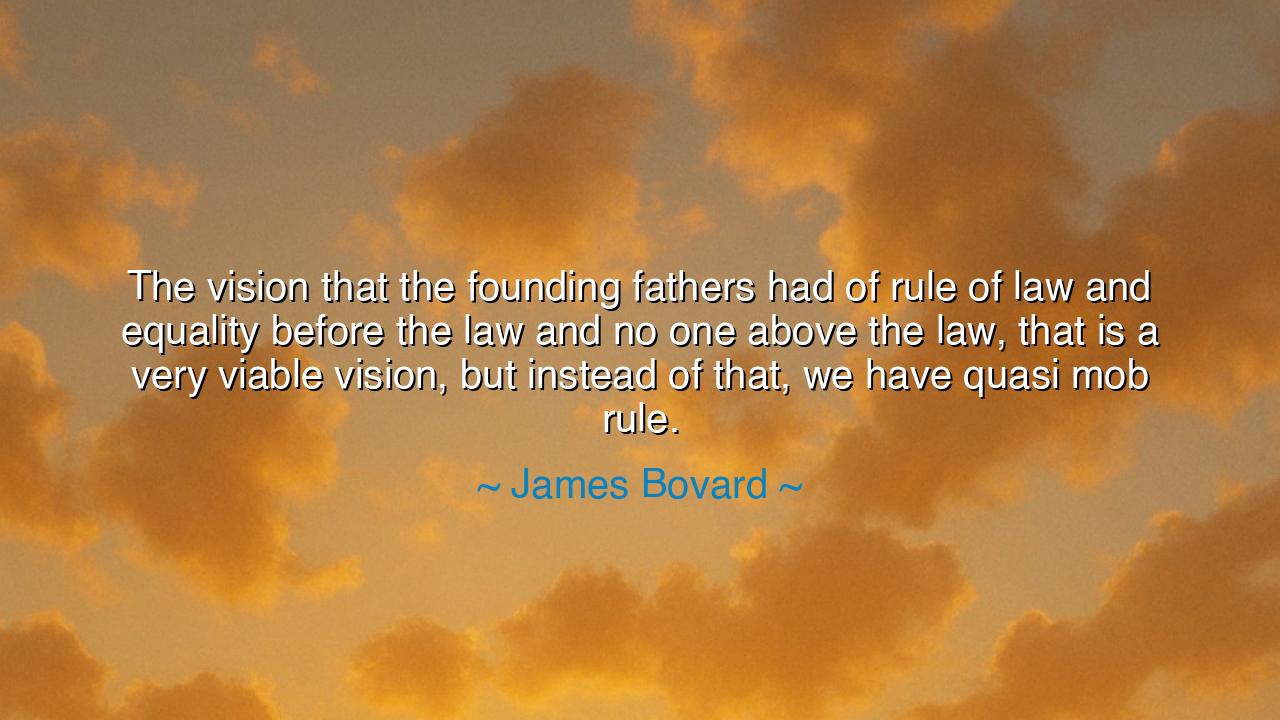
The vision that the founding fathers had of rule of law and
The vision that the founding fathers had of rule of law and equality before the law and no one above the law, that is a very viable vision, but instead of that, we have quasi mob rule.






The words of James Bovard, “The vision that the founding fathers had of rule of law and equality before the law and no one above the law, that is a very viable vision, but instead of that, we have quasi mob rule,” ring like a lament for the lost ideals of civilization. They are not merely the complaint of a disillusioned observer but the cry of a man who sees how far humanity has strayed from its own promises. His words summon us back to the ancient covenant of justice — the sacred agreement that power must bow to principle, and that law, not passion, must govern the hearts of nations. In this single reflection lies both mourning and warning: that when the law no longer stands above the crowd, the crowd will devour the law.
To understand his meaning, we must look back to the founding fathers whose vision Bovard invokes. They were men who, despite their flaws and contradictions, dreamed of a republic rooted not in tyranny or chaos, but in the rule of law — a society where the rights of the weak would be guarded against the might of the strong, where justice would wear a blindfold so she could not favor the powerful or the popular. Their belief in equality before the law was revolutionary, for it sought to bind even kings and generals beneath the same code that ruled the common citizen. This was the legacy of Magna Carta, reborn in the New World — the idea that liberty is not license, but law guided by conscience.
But Bovard’s words speak of a fall from that vision — a descent from lawful order into mob rule. What is “mob rule”? It is not always the mob of the street, shouting with fists raised; it can also be the mob of public opinion, the mob of partisanship, or the mob of corrupted power. It is the tyranny of impulse — when truth bends before popularity, and justice is decided not by reason, but by rage. The ancients feared this fate deeply. Plato, in The Republic, warned that democracy without virtue decays into anarchy, and anarchy into despotism. When the law becomes a mirror of the crowd’s emotions rather than a measure of moral truth, freedom itself becomes a fleeting illusion.
History has shown this pattern again and again. Consider the French Revolution, born from noble ideals of liberty, equality, and fraternity. At first, the people sought justice against kings who believed themselves divine. But soon, the revolution devoured its own children. The Reign of Terror replaced one tyranny with another — mobs ruled the streets, and the guillotine became the new law. The vision of equality perished beneath the frenzy of vengeance. Bovard’s warning echoes this same truth: when justice becomes a weapon of the crowd instead of the shield of the innocent, civilization itself begins to crumble.
And yet, his tone is not without hope. He calls the founding vision “viable”, reminding us that the dream is not dead, only neglected. The rule of law still stands as a pillar, though cracks run deep in its foundation. To restore it, we must reclaim the moral discipline that sustains freedom. Law without virtue becomes mere bureaucracy; virtue without law becomes chaos. The ancients believed that justice was not a natural state — it was a discipline, a practice requiring courage, restraint, and wisdom. If we are to escape “mob rule,” we must once again train the soul of society to revere principle over passion.
Let us then learn from Bovard’s lament. Equality before the law must not be a slogan shouted in anger, but a standard lived in action. The law must protect not the powerful, but the powerless. It must be impartial, even when inconvenient. And each citizen must become a guardian of that ideal, resisting both the tyranny of rulers and the tyranny of mobs. For in every generation, there comes a time when the people must choose between justice and vengeance, between order and chaos. The survival of liberty depends on their choice.
Thus, James Bovard’s words are not only a warning but a torch — one passed down from the founders to us, and from us to those who will come after. The ancients would have called it the “flame of order,” a light meant to guide humanity through the darkness of passion and corruption. If we let that flame die, we return to the shadows of mob and monarch alike. But if we guard it — through integrity, through reason, through courage — then the vision of equality, of justice for all and privilege for none, will burn bright once more. Let each soul remember: the law is not the servant of man, but his mirror — and when it is pure, the world is illuminated by its reflection.






AAdministratorAdministrator
Welcome, honored guests. Please leave a comment, we will respond soon